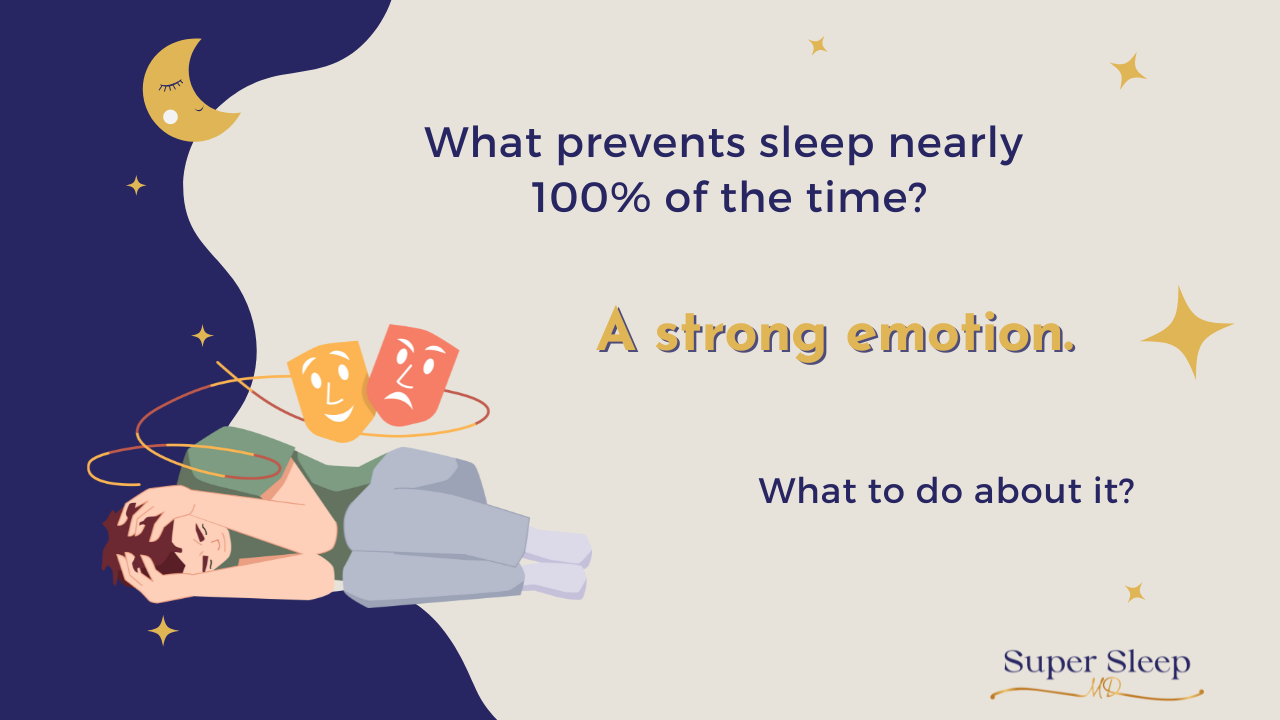61: This does NOT belong in your bedtime routine
May 13, 2023
Sleep comes easily for some people. It’s like they have a talent for it. If that DOESN’T describe you, it doesn’t mean you’ll never be a super sleeper! You simply have to develop sleep skills. Remember . . . skills before pills.
There are things you can do for good “sleep hygiene.” These are activities meant to enhance your sleep probability by setting the right mood and environment for sleep. These behaviors also support your internal sleep rhythms. You can dim the lights, take a warm bath, read a book, or listen to some soft music. These can be signals for sleep AND great self-care activities.
But something signals the opposite– WAKE–and will prevent you from sleeping nearly 100% of the time.
What is it?
A strong emotion.
Your emotions can seem closer to the surface at night, and you can be more sensitive. We are wired to be alert and responsive to strong emotions.
During the day, we are often busy with work, socializing, and other activities. These things distract us from our emotions. We move on to the next thing. . . and the next thing. . . and the next. We don’t always have the time or energy to process what is going on internally.
However, when you are quiet at night your feelings from the day may come out to play. Worry, regret, anxiety, or all the things you should have said to your nosy co-worker. At night you are more likely to ruminate with your thoughts and feelings, which amps up the intensity and leaves you feeling wound up, or like you can’t shut your brain off.
Our internal body clock can also influence our emotions. Some research suggests that negative emotions may be more intense during the evening and night. This could be due to the way our brain processes emotions differently after the sun goes down.
Finally, sleep and emotions are closely linked. In fact, I believe that getting to sleep is an emotional experience. Meaning you are going to be much more successful with sleep if you can move toward relatively neutral and low-intensity feelings to invite sleep. This is partly what the warm bath, soft music, and dim lights are meant to do– turn down the volume of your emotions and find a neutral zone. Bedtime is not the time to doom scroll on your phone, get in a stimulating conversation (read: argument!), or start worrying about all the ways your life is not measuring up to what you thought it would be.
Your thoughts and feelings can get really riled up at night, but you don’t have to spiral down that hole. What to do about it? First, identify what emotions keep you from sleeping. Usually there are just a handful of hot-mess emotions for each person. I’ve already named a few. If those feelings come up at bedtime, I recommend three ways to process or put them on hold: deep breathing, journaling, and meditation.
Then think of emotions that help you to sleep. For example:
- Mentally list things you are grateful for.
- Can you visualize all the details of a place that makes you feel safe and content?
- Will you be in acceptance if you drop your expectations overnight?
- Could you be curious (or even indifferent!) about the behavior of others?
- How can you give yourself compassion at bedtime to achieve the peace you need for deep sleep?
You can generate these feelings from the thoughts that you are thinking. So pick your emotion and get your brain thinking about the thoughts that support it.
There are many things that may keep you awake at night.. But I know that you CAN learn how to sleep better and feel more awake. If you want to know how, check out my online course called
<<<HOW TO FINALLY SLEEP BETTER AND FEEL MORE AWAKE>>>
You've got sleep problems...
so is it time for a sleep study?

